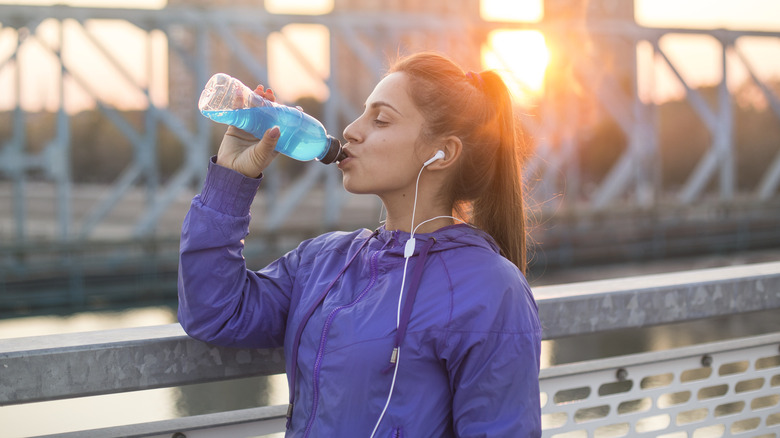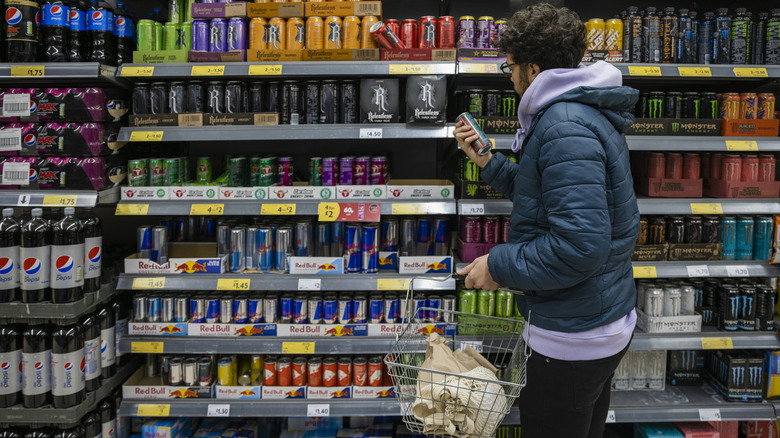How Long It Takes To Build A Tolerance To Energy Drinks (It's Shorter Than You Think)
For many people, energy drinks are a way of life. Rather than grabbing a coffee in the morning, energy drinks come in different flavors and caffeine levels to kick-start your day. However, just like any other caffeinated beverage, your body can build a tolerance to them in as little as a week when you partake in them regularly, per Medical News Today. To understand caffeine tolerance and when it affects you, you first need to dissect energy drinks and their ingredients.
According to the Centers for Disease Control and Prevention (CDC), energy drinks are liquid beverages with large amounts of caffeine, additives, and legal stimulants like taurine and guarana. The National Center for Complementary and Integrative Health (NCCIH) stated these beverages use stimulants to increase energy and alertness. They can also be used to enhance physical performance during sports events. The amount of caffeine varies based on the product. However, the NCCIH notes that many drinks contain 70 to 240mg of caffeine in a 16-ounce drink. Additionally, many of these drinks have high amounts of sugar, which can exceed the daily recommendations. It also mentioned the amount of caffeine in energy drinks can lead to health problems like lack of sleep, digestive issues, and dehydration.
One of the ways that energy drinks lead to issues is because the body builds tolerance to caffeine; therefore, more is needed to get the same level of alertness. This is how caffeine tolerance develops and what you can do to mitigate it.
Time course of caffeine tolerance
Caffeine is a great way to get a morning boost. But when you have it every morning, it loses effectiveness. Research in PLoS One asked eleven participants to drink 3mg of caffeine for 20 consecutive days. Ingestion of caffeine worked to increase peak cycling performance power in incremental exercise for the first 15 days, and then the effect weakened. Additionally, Medical News Today noted it takes about 7 to 12 days for a body to adapt to regular energy drink consumption. Therefore, tolerance to energy drinks happens faster due to their large amount of caffeine.
Registered dietician Anika Christ told CNET, "Developing a caffeine tolerance essentially means that the stimulating effects of caffeine become less noticeable after an amount of time. This is because your body becomes less responsive to the effects." How you develop caffeine tolerance comes down to the way caffeine works on your body.
As Healthline reported, caffeine blocks adenosine receptors in the brain, which play a role in sleep. Blocking them means fewer are playing around in your brain, so you have more room for chemicals like dopamine to keep you feeling awake. However, the more you consume caffeine, the more receptors your body produces, meaning caffeine is less effective.
How to combat caffeine tolerance
Your body is a pretty smart cookie. Because of this, you can't beat energy drink tolerance by just drinking more caffeine. First, your body will quickly become accustomed to drinking two energy drinks instead of one in the morning. Consuming too many energy drinks also brings about negative consequences, like heart complications, per the CDC. Therefore, the U.S. Food and Drug Administration recommends keeping caffeine levels at 400 mg daily or less. So, you have to trick your brain into giving your energy buzz back.
Christ told CNET, "A key step to avoid developing a caffeine tolerance is varying your intake. If you have a few cups of coffee on Monday, maybe have only one or half a cup on Tuesday, then none on Wednesday. Then you can go back up later in the week." By varying your intake, you're keeping your brain on its toes so it doesn't know how many receptors to send out. This means your trusty afternoon energy drink will give you the boost you need to make it to the end of the workday.
It's not easy to cut back on energy drinks, though. Your body gets used to that morning stimulation, so caffeine withdrawal is a monster when you cut back on energy drinks. According to the Cleveland Clinic, lack of caffeine can give you a headache, nausea, tiredness, and irritability. Buying energy drinks only when you need it will help you in the long run.



